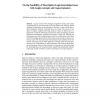Free Online Productivity Tools
i2Speak
i2Symbol
i2OCR
iTex2Img
iWeb2Print
iWeb2Shot
i2Type
iPdf2Split
iPdf2Merge
i2Bopomofo
i2Arabic
i2Style
i2Image
i2PDF
iLatex2Rtf
Sci2ools
120
click to vote
DLOG
2010
2010
On the feasibility of Description Logic knowledge bases with rough concepts and vague instances
Abstract. A usage scenario of bio-ontologies is hypothesis testing, such as finding relationships or new subconcepts in the data linked to the ontology. Whilst validating the hypothesis, such knowledge is uncertain or vague and the data is often incomplete, which DL knowledge bases do not take into account. In addition, it requires scalability with large amounts of data. To address these requirements, we take the SROIQ(D) and DL-Lite family of languages and their application infrastructures augmented with notions of rough sets. Although one can represent only little of rough concepts in DL-Lite, useful aspects can be dealt with in the mapping layer that links the concepts in the ontology to queries over the data source. We discuss the trade-offs and demonstrate validation of the theoretical assessment with the HGT application ontology about horizontal gene transfer and its 17GB database by taking advantage of the Ontology-Based Data Access framework. However, the prospects for comprehe...
Related Content
| Added | 10 Feb 2011 |
| Updated | 10 Feb 2011 |
| Type | Journal |
| Year | 2010 |
| Where | DLOG |
| Authors | C. Maria Keet |
Comments (0)

